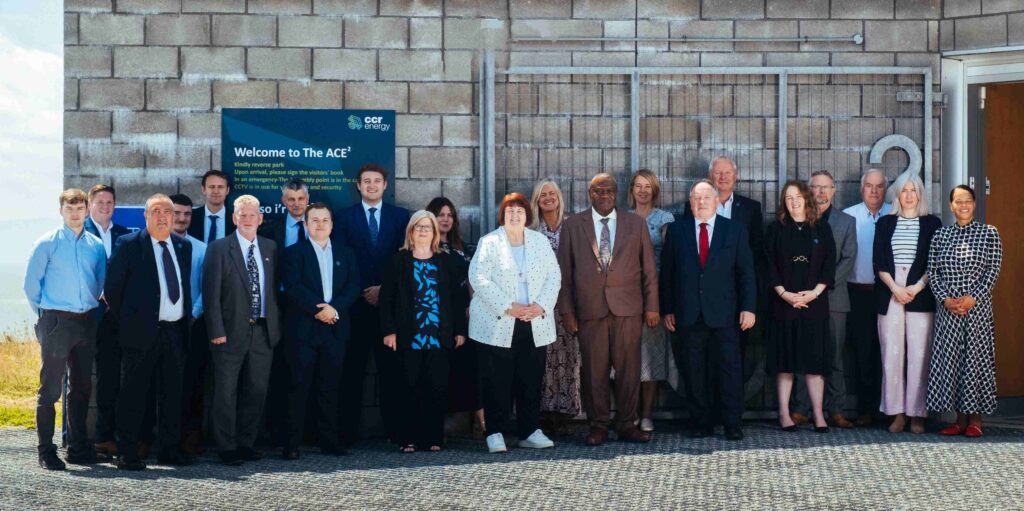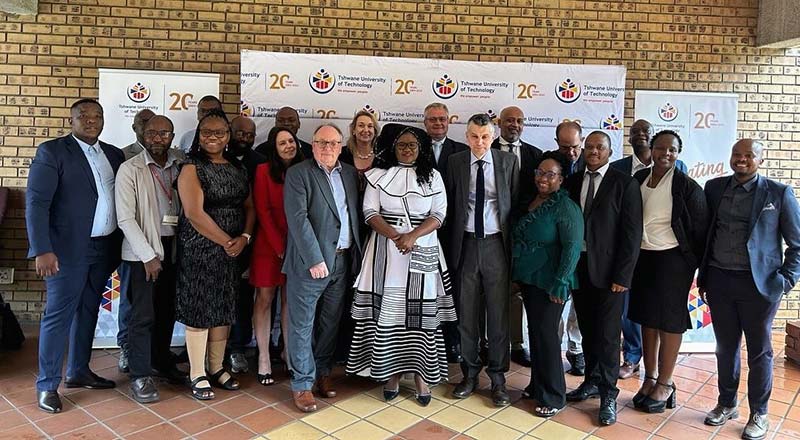
Aberthaw, South Coast of Wales
The UK2070 Commission Taskforce led a strategic international mission welcoming His Excellency Mr Jeremiah Nyamane Mamabolo, High Commissioner of South Africa to the United Kingdom, to the former Aberthaw power station on the south coast of Wales.
The visit was hosted by CCR Energy Limited, a company wholly owned by Cardiff Capital Region (CCR) and established to oversee redevelopment into a low carbon destination.
As a flagship component of the UK2070 Taskforce Programme, this post industrialisation collaboration linking Teesside, Cardiff and Komati in the Mpumalanga region of South Africa, the Aberthaw site exemplifies the transformation of legacy infrastructure into a model of clean energy innovation and regional regeneration.
The visit reinforced growing cooperation between UK regional leadership and South Africa on shared challenges including industrial decarbonisation, skills transition, and inclusive growth.
Professor Michael Henson, Chair of the UK2070 Taskforce Programme, commented:
“High Commissioner Mamabolo’s visit underscores the Taskforce’s commitment to delivering international collaboration rooted in place. Aberthaw demonstrates how strategic repurposing, led by regional innovation and backed by global diplomacy, can unlock real change.”
His Excellency Mr Jeremiah Nyamane Mamabolo stated:
“It is a privilege to witness the transformative progress underway at Aberthaw. We hold in high regard the work of the UK2070 Commission Taskforce, not only in advancing net-zero objectives but also in promoting a people-and-place-centred approach to development. This partnership exemplifies how international cooperation can support inclusive growth, shared prosperity and sustainable communities across both South Africa and the United Kingdom.”
Baroness Wilcox of Newport added:
“As an advocate for Wales and the people of Wales, I was proud to join this important visit. Aberthaw stands as a powerful example of local ambition connected to global opportunity. This international partnership is beyond invaluable – for our communities today, and for future generations across both nations.”
Professor Steve Cummings, Pro Vice Chancellor and Knowledge Exchange, Teesside University said:
“This visit reinforces Teesside University’s commitment to research-led transformation in collaboration with global partners. We are proud to support the UK2070 Taskforce in advancing practical innovation and cross-continental knowledge exchange – connecting places like Teesside, Aberthaw and Komati through shared values, research excellence and sustainable growth.”
Cllr Bronwen Brooks, Chair of CCR Energy, said:
“It was a privilege to welcome High Commissioner Mamabolo to Aberthaw, a site at the centre of our region’s clean energy ambitions. His visit highlights the strength of our growing international partnerships. We thank the UK2070 Commission and Baroness Wilcox for their continued support, and look forward to future collaboration with South Africa and Teesside – driving innovation, opportunity, and a just transition for our communities.”
Cllr Mary Ann Brocklesby, Leader, Monmouthshire Council, and Chair, Cardiff Capital Region (CCR), added:
“Partnerships are at the heart of our work here at CCR. We value this significant international collaboration, as we share the common mission to deliver transformational clean energy projects that will shape our regions, grow our economies, and create a future that is inclusive and prosperous for generations to come.”
Highlighting the investment by Cardiff Capital Region in the repurposing of Aberthaw by its company, CCR Energy, the visit showcased the importance of international cooperation, and the region’s vision for a clean energy future.
The visit included site tours, stakeholder roundtables and forward-planning sessions on:
- The co-design of Virtual Net Zero Centres in South Wales, Teesside and Komati, South Africa
- Academic collaboration through the South African Presidential PhD Programme
- Joint funding opportunities
- Ongoing engagement with the South African Presidential Climate Commission, CCR Energy, Cardiff Capital Region, Cardiff University, Teesside University, and South Africa’s Department of Science and Innovation
This VIP visit confirms the UK2070 Taskforce’s leadership in shaping global partnerships that drive forward climate action, innovation, and regional renewal – anchored in local assets and connected across borders.
ENDS
Media Contact:
UK2070 Commission Secretariat
Notes to editor
About The UK2070 Commission
The UK2070 Commission is an independent inquiry into city and regional inequalities in the United Kingdom. Formally launched in the House of Lords in October 2018,
established to conduct a review of the policy and spatial issues related to the UK’s long-term city and regional development.
The UK2070 Taskforce Programme
The UK2070 Commission established a programme of locally based taskforces in support of the ambition for all cities, regions and nations to be at the heart of the UK’s drive for a future greener, more inclusive economy. These collaborative partnerships enable enhanced capacity for strategic action on those matters that need a wider geographical perspective, for example, economic development and connectivity.
About CCR Energy
Cardiff Capital Region (CCR) has established CCR Energy to lead the development of an innovative low-carbon energy destination at the iconic Aberthaw Power Station site. This initiative aims to push the boundaries of green energy solutions for South East Wales.
CCR Energy is dedicated to advancing renewable energy innovation through collaboration and sustainable infrastructure development. The organisation’s focus on repurposing existing assets and pioneering new technologies supports the UK’s commitment to green energy and the global Race to Net Zero.
About Cardiff Capital Region
Cardiff Capital Region (CCR) is a regional body (also known as a Corporate Joint Committee) made up of the 10 councils across South East Wales. It has been working together successfully as a partnership since 2017 through the CCR City Deal. Its investments and wider activity has already created and safeguarded more than 3,000 jobs across our region; supported over 200 businesses and invested millions in the Metro transport system.




